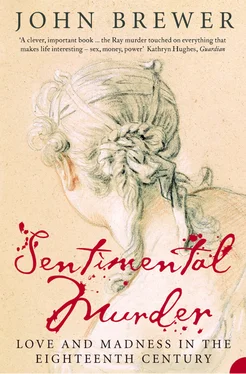Whether James had been told the news by Caterina Galli or another messenger is not clear – ‘all was confusion and astonishment 24 ’. Galli had fainted 25 in the coach when Ray was killed and could not recall what happened thereafter, although we know she returned to the Admiralty in Sandwich’s coach. Sandwich had enough presence of mind to dispatch a servant to the Shakespeare Tavern to watch over Ray’s body and exclude prurient visitors. At seven the following morning he scribbled a hasty note to his friend Robert Boyle Walsingham, an aristocratic young naval officer, ‘For gods sake come to me immediately, in this moment I have much want of the comfort of a real friend; poor Miss Ray was inhumanly murthered last night as she was stepping into her coach at the playhouse door … The murtherer is taken and sent to prison.’
Two hours later, Hackman was brought before Sir John Fielding at Bow Street. Fielding led Hackman to a private room ‘in order to prevent, as much as possible, the unhappy prisoner from being exposed to the view of wanton, idle curiosity 27 ’, and had the witnesses’ testimony sworn before him. Hackman was no longer calm but visibly agitated: ‘From the agonizing pangs which entirely discomposed and externally convulsed him, it was some time before the Magistrate could proceed 28 .’ Asked if he had anything to say Hackman replied that ‘he wished for nothing but death; that nothing could be more welcome; that the sooner it came the better, for that alone would relieve him of the extreme Misery he laboured under 29 ’. Fielding committed him to Newgate, where he asked that he be granted his own room, a request that Fielding accepted on condition that he did not stay alone, as the court feared that he might again seek to take his own life. He was scheduled to be tried at the next sessions at the Old Bailey, set for 16 April.
That same afternoon 30 the coroner’s jury met at the Shakespeare Tavern in the room where Sandwich’s servant still guarded Ray’s body. The corpse was examined by two surgeons, Mr O’Brien and Mr Jarvis, who showed that the bullet had entered Ray’s forehead on the right side, causing massive damage, and then exited near the left ear. Hackman who, at five foot nine, was several inches taller than Ray, must have been pointing his pistol downwards when he fired; this would also explain why Macnamara believed that the blow he felt to his arm was caused not by Ray’s fall but by the spent bullet that had killed her. During the inquest, against the advice of Mr O’Brien and much to the distress of Sandwich, it was decided to open Ray’s skull in order to trace the trajectory of the wound. The doctors ‘owned that they never saw 31 so dismal and ghastly a fracture’; the inquest brought in a verdict of wilful murder.
That day all 32 of Lord Sandwich’s servants ‘out of livery’ changed into mourning clothes. In the evening Sandwich had Ray’s body removed to an undertaker’s near Leicester Fields. One paper reported that she was wrapped in a sheet or shroud and that she would be buried wearing the valuable clothes and jewels she wore at the moment of her murder, ‘so that property 33 to the amount of near £2000 will be deposited in her coffin’. On 14 April, Ray was interred in a vault in Elstree church, where her mother, who had died three years previously, was also buried.
Sandwich’s grief did not stop him taking decisive action in the days after Martha Ray’s murder. He employed Walsingham and two lawyers, Mr Balding and Mr William Chetham, to take depositions and informations from Signor Galli, his wife Caterina and Macnamara; they also questioned Hackman and discussed the case with Sir John Fielding. Sandwich himself questioned Signor Galli on the day after Ray’s death. He learnt that Hackman had contacted Ray about a week earlier. (A scribbled note from Ray to Caterina Galli of 30 March – ‘My Dear Galli 34 I am in open distress I beg you come immediately to me’ – possibly refers to the contact.) Ray gave the Gallis her letter to Hackman asking to be left alone, and they read it to Hackman on the evening of 5 April. Galli assured Sandwich that there had been no assignation or meeting between Ray and Hackman at his house, and that, though he had seen Hackman walking in St James’s Park, he had avoided him.
The same day Sandwich sent a message via Walsingham to Hackman telling the murderer of his forgiveness, though the press reported that the Earl also claimed that Hackman ‘has disturbed his peace of mind for ever 35 ’. Hackman, on his part, told Walsingham ‘upon his word 36 as a dying man, that he has never spoken to Miss Ray since the beginning of the year 1776, at which time he had proposed marriage and was rejected’. The murderer was pleased to be assured that his victim had no other special admirer: ‘poor Miss Ray was innocent. He lays the whole on Galli’ – and expressed his determination to die. ‘He is desirous to dye by the hand of the law … he wishes not to live himself, he told me today,’ wrote Walsingham to Sandwich, ‘he hoped to suffer as soon as possible 37 .’
The agreement between Sandwich and Hackman that Martha Ray was innocent of any wrongdoing placed Caterina Galli in a difficult position. A day after the murder a story was already circulating that Hackman’s decision to kill Ray, and not merely to end his own life, was explained by a stratagem of Galli’s: to get Hackman to leave Ray alone, she had told Hackman that Ray had tired of him and had a new secret lover. Seeing Ray with male companions at the play, he had been driven into a frenzy of jealousy.
The papers reported that Sandwich offered to secure a pardon for Hackman if he were convicted. (As a member of the cabinet, which determined such matters, Sandwich would certainly have been able to exert great influence on Hackman’s behalf, and he clearly did not relish the role of sitting in judgment on a person’s life. Years earlier, commenting on this cabinet function, he had written to a friend, ‘you can’t think how it distresses me to be put to a momentary decision where a man’s life is concerned 38 ’.) But as early as two days after the murder Hackman seems to have rejected the Earl’s aid, an act that was rightly interpreted as a determination on his part to die. For, as Fielding explained in a letter to Sandwich on 10 April, Hackman’s conviction seemed inevitable:
I am clearly of opinion 39 that the evidence against Hackman is full and compleat to the last degree and that he can make no defense that would not aggravate his guilt and tend to his conviction; but will not neglect any hint your Lordship gives. As to Insanity it cannot be offered as an excuse as it appeared and can be proved that he was rational and sensible of his Wickedness at 4 in the morning, when I examined him, and has been so ever since.
At first Hackman said that he would plead guilty as charged of Ray’s murder. But in the days after the crime, his sister, his brother-in-law, Booth, and the lawyer who was acting on his behalf, Manasseh Dawes, persuaded him ‘to avail himself of the plausible plea of temporary insanity 40 ’. The trial came on at 9.30 on the morning of 16 April. Hackman was defended by Davenport and Silvester, the prosecution conducted by Henry Howarth and Sir John Fielding. The courtroom was packed with fashionable society, the same sort of people who had witnessed the murder the week before. James Boswell, who had visited Hackman’s brother-in-law on a number of occasions and seen Hackman himself in prison, was sitting at the table of defending counsel. John Wilkes, the radical libertine who was one of Sandwich’s most bitter political enemies, was also present, as were a number of famous aristocratic beauties. (Boswell was shocked when Wilkes passed him a note during the trial that said, ‘I always know where the greatest beauty in any place is when Mr Boswell is there, for he contrives to be near her, but does not admire the first grace more than Mr Wilkes does 41 .’) Frederick Booth, who had worked so hard to help his brother-in-law, felt unable to watch the proceedings and awaited the verdict outside the court.
Читать дальше












